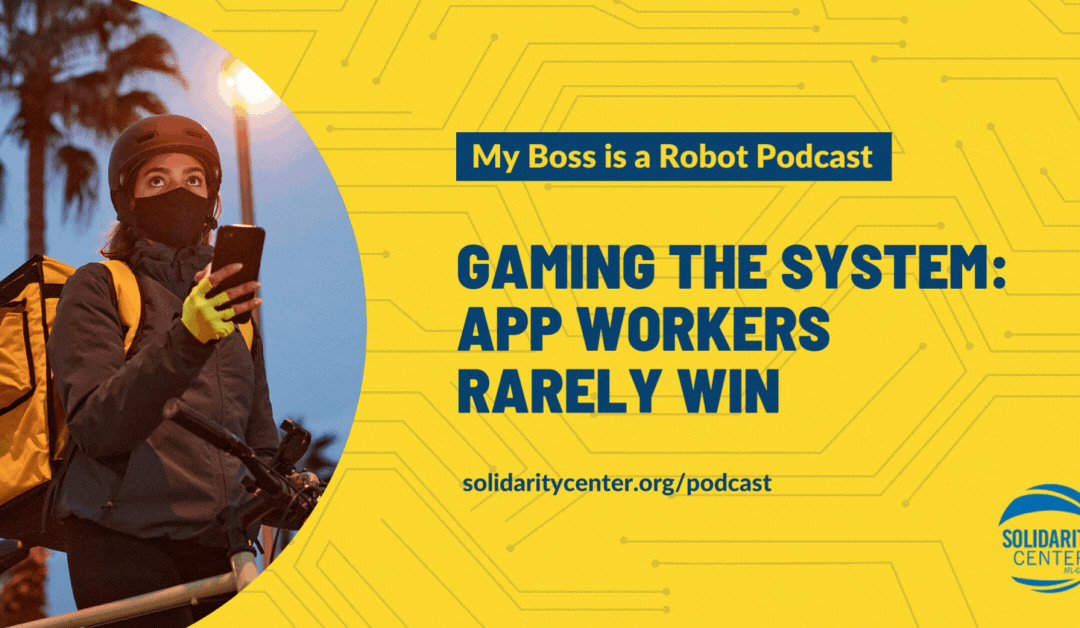
Sep 27, 2023
Food delivery and passenger service drivers and are forced to follow the company apps. But if apps miscalculate and send drivers in the wrong direction, or lower wages for drivers stuck in traffic, it’s the driver who loses wages, or is even booted from the platform. The latest episode of My Boss Is a Robot shows that for app-based companies, these are not bugs–they are built into an algorithmic system designed to move money from workers and into the pockets of the rich corporate bosses.
From Thailand, delivery driver Niap Chunti Ta Kai See Kun tells Podcast Host and Solidarity Center Executive Director Shawna Bader-Blau that the app often shows his destination far closer than it really is–sometimes indicating a route straight through buildings.
“The distance in the Google Map, for an example, is five kilometers, but the distance in the application map is always shorter, like three kilometers,” he says. “I think that’s not a mistake, they intend to do that because that will reduce the pay and that will reduce the cost for the application. The shorter the distance, the less they have to pay us. But the longer the distance, the more they have to pay us.”
Drivers also work long hours and rush between deliveries because if they don’t, the app punishes them by lowering pay.
“And that’s why you see some drivers died on the wheel,” says Lawal Ayobami, an app-based driver in Nigeria. “There was no rest for the driver. They don’t even go to their family. They’re on the road because they want to make money.”
Delivery Drivers Stand Up for Their Rights
Delivery drivers around the world are standing up for their rights: Earlier this year, Nigeria’s Ministry of Labor recognized the Amalgamated Union of App-Based Transport Workers of Nigeria after delivery drivers organized in cities across the country.
“That means workers like Ayobami will begin to get the protections and benefits they deserve in this highly unregulated and informal sector,” says Bader-Blau.
“My Boss Is a Robot” is a six-part series that seeks to shine a light on the behind-the-scenes practices of app companies who exploit workers in the global gig economy. Download the latest episode, Gaming the System: App Workers Rarely Win, and watch for the next episode on October 11.
Listen to this episode and all Solidarity Center episodes here or at Spotify, Amazon, Stitcher or wherever you subscribe to your favorite podcasts.
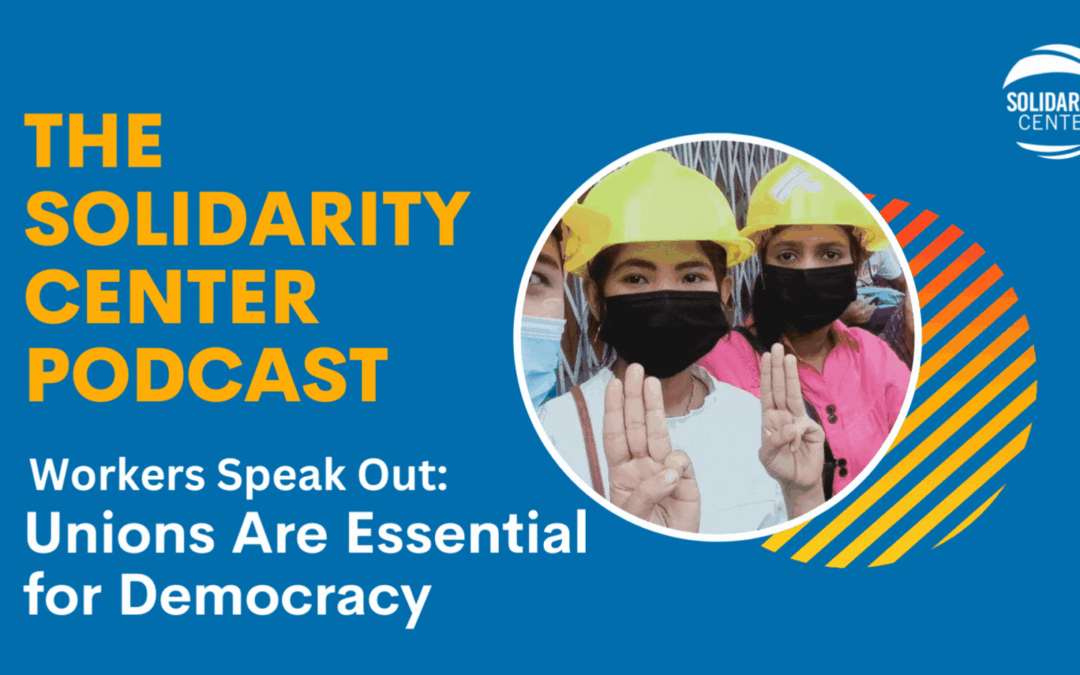
Mar 29, 2023
Workers from around the world, including those exiled from Belarus, Eswatini and Myanmar for forming unions, striking and trying to speak freely, describe why democracy is important—and why unions are key to democracy—in a special episode of The Solidarity Center Podcast.
This week, high-level policy makers, including U.S. Vice President Kamala Harris, are gathering for Summit on Democracy events in Washington, D.C., and in Zambia, where the spotlight will be on how to amplify worker voices to safeguard democracy in Africa and globally. (Register for an official Summit side event in Zambia focused on worker rights.)
“Workers know the importance of unions to democracy—and what democracy means in their lives,” says Solidarity Center Executive Director and Podcast host Shawna Bader-Blau. “The union movement is the strongest voice for democracy.”
One of the workers the episode highlights is Lizaveta Merliak, a union leader exiled from Belarus, who speaks out from Germany, where she and other union leaders were forced into exile.
“I’m one of a few trade unionists who escaped from Belarus after the liquidation and repression of democratic trade unions—unlike my comrades, leaders, and activists of democratic trade unions who are jailed and tortured in prisons.
“We must support the aspirations for democracy in every way we can and, at the same time, preserve and develop the idea of grassroots democracy at workplace. We will revive the independent trade union movement in Belarus, with the aim of creating a democratic society based on the principles of social justice and decent work.”
Listen to the full episode here.
Follow the Summit for Democracy events on Twitter @SolidarityCntr and on Facebook at Solidarity Center.
DOWNLOAD RECENT EPISODES!
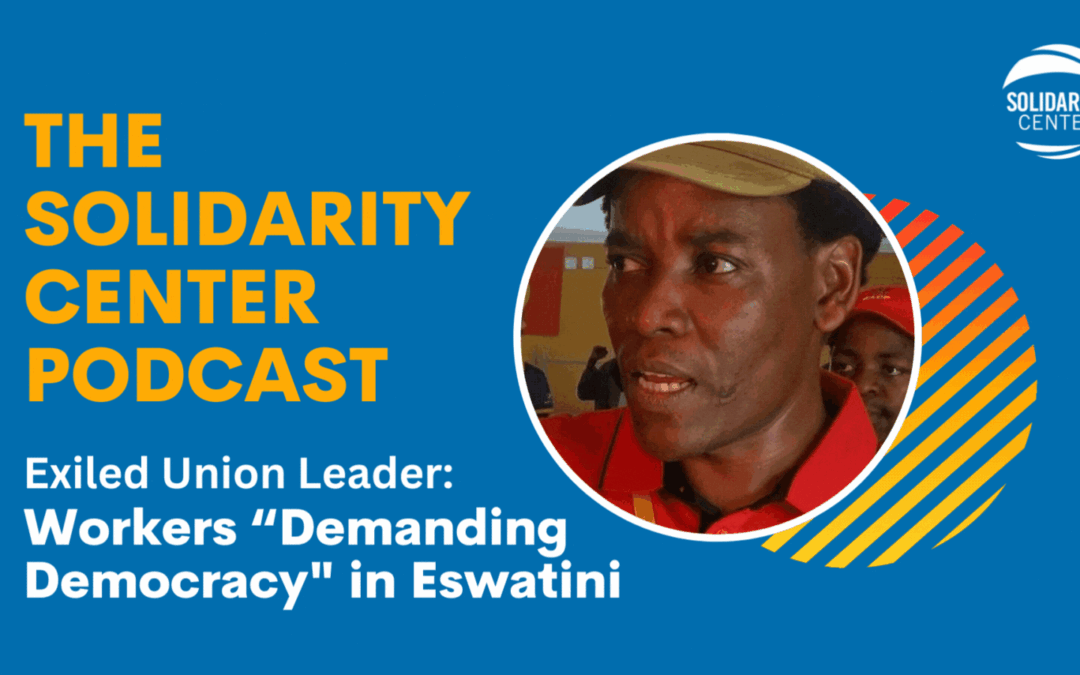
Mar 16, 2023
In Eswatini, a landlocked country in southern Africa, union workers are routinely harassed, attacked and even killed for going on strike or holding rallies. In 2021, dozens of workers were killed by security forces in what Amnesty International called “a full-frontal assault on human rights” by the government in response to ongoing pro-democracy protests. In January, prominent human rights lawyer Thulani Maseko was shot dead, hours after a speech by the king warning those calling for democratic reforms that mercenaries would deal with them.

Exiled SWATCAWU leader Sticks Nkambule is receiving support from SCAWU and other unions in Eswatini. Credit: SCAWU
Most recently, Sticks Nkambule, general secretary of the Swaziland Transport, Communication and Allied Workers Union (SWATCAWU), was targeted by the government for leading a strike to improve working conditions. Forced to flee Eswatini, formerly called Swaziland, Nkambule described the interconnected struggle for worker rights, human rights and democracy on the latest Solidarity Center Podcast.
“We are just demanding the basics of what could be defined as democracy. A government that is formed by the people and serving their interests,” Nkambule told Podcast host and Solidarity Center Executive Director Shawna Bader-Blau.
“By bringing together the collective voice of all workers, unions fight for decent working conditions but also for the freedoms fundamental to all democratic societies,” Bader-Blau told Nkambule.
Despite the brutality and repression, Nkambule finds hope in the support from labor and human rights organizations around the world—and in workers themselves.
“What is quite inspiring is that the people of Swaziland are determined to be part of the conversation that is going to change their discourse. It is a reality, activists and, not just labor, beyond labor.”
Listen to this episode and all Solidarity Center episodes here or at Spotify, Amazon, Stitcher, or wherever you subscribe to your favorite podcasts.
Download Recent Episodes!
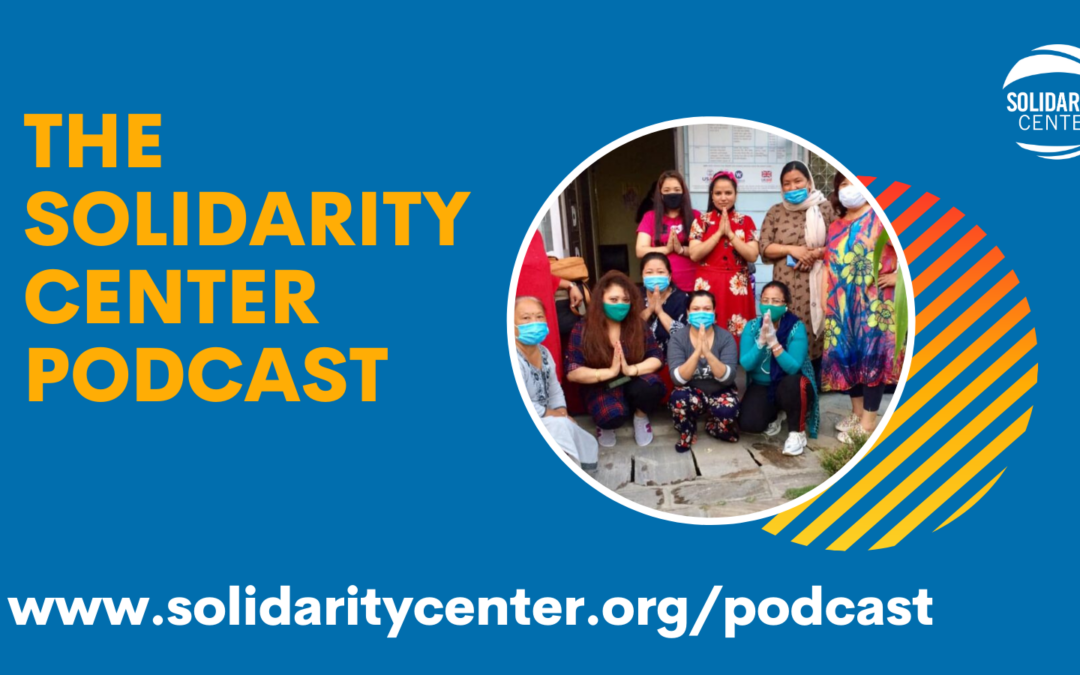
Mar 24, 2021
Migrant workers worldwide have been especially hard hit in the pandemic, suffering reduced pay, lost jobs and little access to social support programs like unemployment insurance. In Thailand, migrant rights groups estimate that since COVID-19, 700,000 workers are either unemployed or not receiving full pay.
But as migrant rights attorney Preeda says on this week’s episode of The Solidarity Center Podcast, Thai unions are standing up for migrant workers, helping them organize to better advocate for their rights and negotiate with their employers to improve working conditions. And, throughout the COVID-19 crisis, unions have helped connect jobless migrant workers with aid organizations and other vital support.
“Before the pandemic of COVID-19, we already connected with the labor unions, especially for those sectors that have migrant workers in the workplace,” Preeda tells host and Solidarity Center Executive Director Shawna Bader-Blau. “We can work with the Thai partners and the unions to continue to promote labor rights and human rights in Thailand. We help and ensure that the workers get respect.”
Billions of Us, One Just Future
 The Solidarity Center Podcast, “Billions of Us, One Just Future,” highlights conversations with workers (and other smart people) worldwide shaping the workplace for the better.
The Solidarity Center Podcast, “Billions of Us, One Just Future,” highlights conversations with workers (and other smart people) worldwide shaping the workplace for the better.
Be sure to catch last week’s episode in which Bader-Blau talks with worker rights advocates in Belarus and Brazil about how workers are standing up for their democratic freedoms in repressive regimes.
Join us for a new episode each Wednesday on iTunes, Spotify, Amazon, Sticher or wherever you subscribe to your podcasts.
SOLIDARITY CENTER PODCAST SCHEDULE
- April 7: Francia Blanco, a domestic worker and trans rights activist reaching marginalized workers through her all-trans domestic workers union
- April 14: Adriana Paz, an advocate with the International Domestic Workers Federation who understands firsthand the power of unions in ensuring domestic workers have safe, decent jobs
- April 21: International Trade Union Confederation President Ayuba Wabba, who explores the Nigerian labor movement’s response to the COVID crisis on workers and discusses the global labor movement’s plans to build back better for workers around the world

Mar 10, 2021
“Violence and harassment happens to all workers, irrespective of your gender,” says Brenda Modise, a union activist in South Africa. “It doesn’t matter whether they are men and women, old young LGBTQI community or anyone, but we are addressing violence and harassment in the world of work against all workers.”
Modise spoke with Solidarity Center Executive Director Shawna Bader-Blau in first episode of The Solidarity Center Podcast, “Billions of Us, One Just Future,” which highlights conversations with workers (and other smart people) worldwide shaping the workplace for the better.
(Join us for a new episode each Wednesday at iTunes, Spotify, Amazon, Stitcher or wherever you listen to your podcasts. )
Front-line Leaders Building a Future Inclusive of All Workers
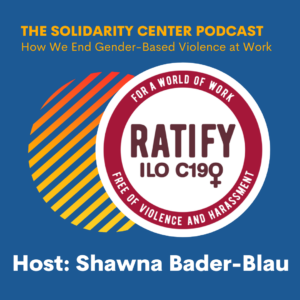 The Solidarity Center Podcast’s seven-episode season will feature worker advocates from around the world:
The Solidarity Center Podcast’s seven-episode season will feature worker advocates from around the world:
- Maximiliano Garcez, a labor rights lawyer who describes workers’ efforts to seek justice following a deadly mining accident in Brazil.
- Adriana Paz, an advocate with the International Domestic Workers Federation who understands firsthand the power of unions in ensuring domestic workers have safe, decent jobs.
- International Trade Union Confederation President Ayuba Wabba, who explores the Nigerian labor movement’s response to the COVID crisis on workers, and discusses the global labor movement’s plans to build back better for workers around the world.
- Preeda, a migrant worker rights activist in Thailand working with unions to help migrant workers meet the challenges of COVID-19.
- Sergey Antusevich, a brave union leader in Belarus working for democratic freedom in a repressive regime.
- Francia Blanco, a domestic worker and trans rights activist reaching marginalized workers through her all-trans domestic workers union.
These front-line leaders will share the steps they are taking to shape their livelihoods at the workplace and in their communities in the face of escalating attacks on democracy and civil rights, and explore how they seek to build a more equitable future, one inclusive of all workers as the COVID-19 pandemic upends structures, systems and societies.
‘Tears of Joy’
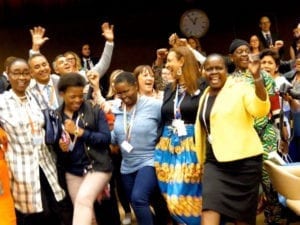
Union activists celebrate after the ILO adopts Convention 190 to end gender-based violence at work. Credit: ITUC
In the first episode, Modise shares how she and women unionists around the world campaigned for adoption of an International Labor Organization convention (regulation) on ending gender-based violence and harassment in the world of work, and how they are moving forward the campaign by pushing their governments to ratify Convention 190.
“We need to put more effort as the women in South Africa to make sure that whatever that you have were fought for is going to be realized in South Africa and be incorporated into our own legislation and make sure that it is implemented. We should not only have beautiful legislation, but we should have implementable legislation that we can be able to monitor and evaluate.”
As Modise heard an audio clip of women unionists singing and clapping the moment Convention 190 was adopted in 2019, she reflected on her experience.
“It was a breathtaking moment. We all shed tears. It was tears of joy because remember, when you went into that room as workers of the world, we knew what we wanted, but we didn’t know if the business constituents of the world understand where we are coming from.
“It really feels great, even though the bigger work has not yet started. We really want South Africa to ratify the convention. The work is not going to be ending at ratification. It’s also going to go in terms of after ratification, what next, and that’s where the bigger role and our activism is going to be needed.”
This podcast was made possible by the generous support of the American people through the U.S. Agency for International Development (USAID) under Cooperative Agreement No.AID-OAA-L-16-00001 and the opinions expressed herein are those of the participant(s) and do not necessarily reflect the views of USAID/USG.






 The Solidarity Center Podcast, “Billions of Us, One Just Future,” highlights conversations with workers (and other smart people) worldwide shaping the workplace for the better.
The Solidarity Center Podcast, “Billions of Us, One Just Future,” highlights conversations with workers (and other smart people) worldwide shaping the workplace for the better.
 The Solidarity Center Podcast’s seven-episode season will feature worker advocates from around the world:
The Solidarity Center Podcast’s seven-episode season will feature worker advocates from around the world: